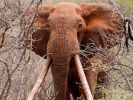Eye For Film >> Movies >> White Gold (2013) Film Review
White Gold
Reviewed by: Anne-Katrin Titze

Simon Trevor's documentary White Gold on the organised poaching of elephant tusks, narrated by former US Secretary of State Hillary Rodham Clinton, puts an end to fantasies of glamour and harmless luxury based on ignorance and lies.
The German word for ivory is Elfenbein, which translates as 'leg of a fairy', conjuring images of beautiful objects carved out of the strong tusks of marvellous elephants.

The ivory trade is a very bloody business. Renewed developments of organised poaching, the demand from a newly prosperous Chinese market and soaring ivory prices seriously endanger the elephant's survival as a species. "Columbia has cocaine. Afghanistan has opium. Africa has ivory." The film, in brief, precise steps, throws harsh light on why today the largest land mammal is on the brink of extinction.
Experts such as Dr Iain Douglas-Hamilton, founder of Save The Elephants, give concrete data collected over the years about the massive slaughters. Since 2008, mostly due to the increased demand for ivory from the newly established middle class in China, poaching of elephants has spiralled out of control. Patrick Omondi, deputy director of the Kenya Wildlife Service talks about the black market. Clinton sums it up: "The ivory trade is now the domain of international criminal organisations comparable to the illegal trade in drugs, arms and human trafficking."
A short excursion into the history points out that with the advent of the slave trade, followed by European hunters, the wholesale slaughter began, and that while in the past the durability of ivory had no substitute, today with synthetics, there really is no practical reason to buy it.
It is well known how smart elephants are, how their remarkable memory serves them well and that they have a matriarchal head. In White Gold, we see footage of elephants mourning their dead, caressing the bones and skulls of dead family members with their trunks.
In Uganda, south of the river Nile, in 1980, the elephant population through poaching was decreased from 8000 to 160. As the threat escalated, Kenya, in 1989, in a symbolic act, destroyed its stockpile of ivory, which would have been worth a fortune, to draw attention to the crisis in an attempt to stop the slaughter. Other countries followed. Governments woke up. In Lausanne, Switzerland, CITES (Convention on the International Trade in Endangered Species), a global organisation of 178 member nations, established an Ivory Trade Ban in 1989. Throughout the 1990s, the elephant population recovered and only since the vastly increased demand from China have the numbers become disastrous.
At the centre of the problem lies profitable misinformation. Many people are told or want to believe that the tusks fall out and re-grow like a clipped fingernail. A comfortable untruth, that avoids the fact that the animals have to be killed to get the ivory. In addition, the consequently orphaned tuskless baby elephants cannot survive without their mothers and die as well. In a remarkable aside, Clinton's narration points out that killing a panda in China is punishable with death, while poaching of other wildlife is seen as a minor offense in many parts of the world.
As tusks of a dying species become more valuable, more people invest in the cruel trade, determined by market supply and demand. The bands of poachers are seen as highly organised and the use of helicopters widens their range. African tourism is severely affected. "Some countries are arming their rangers and community conservancy scouts to guard against poachers," Clinton points out. The rangers of the wildlife conservancies are in danger as well, often brutalised like the elephants, and even killed.
Ian Saunders, a co-producer of the film and the co-founder of Tsavo Trust can be seen speaking at the US Congressional Conservation Caucus Hearing on November 15, 2012 where he connects the partial funding of terrorist attacks on two embassies in East Africa to the ivory trade. The question is asked, "are we doing enough to deny ivory as an untraceable source of revenue for terrorists?"
Tempted by a tiny elegant ivory egg spoon? White Gold makes it appropriately difficult to feign oblivion as to where the luxury item came from. Quite like the rabbit fur collar on your anorak is no longer harmless, once you open the door to knowledge, ivory has to lose its allure. Blood is on the keys - and you can't remove the awareness.
The African Environmental Film Foundation production White Gold is an exemplary wake-up call from collective consumerist slumber.
DOC NYC has a special event screening on Monday, November 18 at 7pm - IFC Center. Scheduled to appear: Director Simon Trevor with producer Arne Glimcher.
Reviewed on: 12 Nov 2013
















